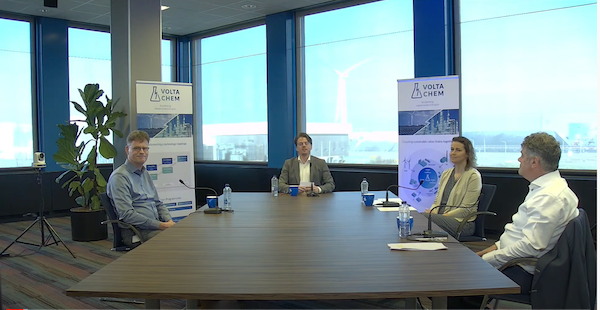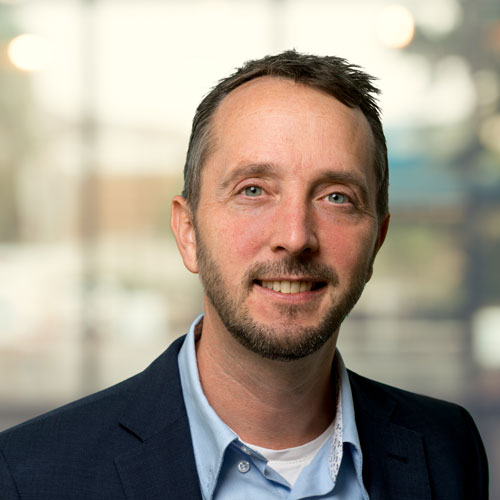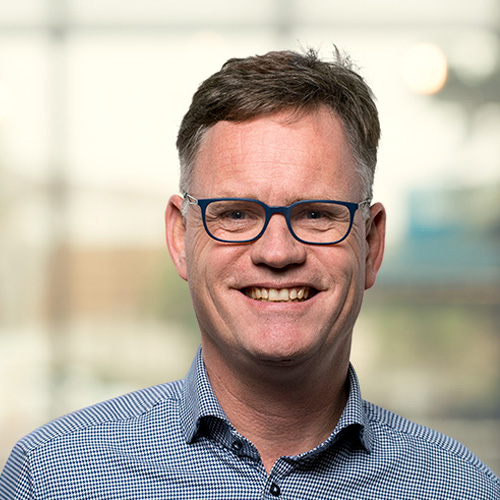

Successful 1st edition of VoltaChem Power-2-X Tour
15-04-2021 | Event report | P2Integrate
Viable Value Chains - The Northwest European industry region as electrified supercluster
 The first edition of VoltaChem’s virtual Power-2-X Tour on March 31st was a great experience. About 185 viewers attended the livestream of this online talk show. Guests at the table and experts providing online pitches jointly elaborated on the Power-2-Integrate theme of 'Viable Value Chains - The Northwest European industry region as electrified supercluster'.
The first edition of VoltaChem’s virtual Power-2-X Tour on March 31st was a great experience. About 185 viewers attended the livestream of this online talk show. Guests at the table and experts providing online pitches jointly elaborated on the Power-2-Integrate theme of 'Viable Value Chains - The Northwest European industry region as electrified supercluster'.
The livestream was broadcast from the Uniper Power Plants at the Maasvlakte industrial area in Rotterdam. Host Jerre Maas and co-host Reinier Grimbergen (Principal Consultant at VoltaChem/TNO), were accompanied by Yolande Verbeek (COO at Uniper Benelux), Frank Kuijpers (General Manager Corporate Sustainability at SABIC) at the table. Ruud Melieste (Corporate Strategist at the Port of Rotterdam Authority) contributed to the table discussion via a video connection from Germany. Each of these experts presented a dilemma, statement or proposition that prompted a poll to which the viewers of the livestream could provide their input.
A diverse audience
For starters, a poll was held regarding location and background of the audience. It turned out participants were located all over the world in places as diverse as Singapore, Australia and the US. About 40% of the audience were policy makers; the process industry and energy sector both accounted for approximately 25%. Although the guests at the table had expected an audience mainly from industry, they more than welcomed policy makers. According to Kuijpers: "Policy makers really need to understand the matter to be able to steer industry and society in the right directions." Verbeek called for the development of long-term policies, which was underpinned by Grimbergen who explained the relevance of providing security for industry to make investments with an acceptable risk. Melieste emphasized the importance of having the infrastructure for the new era in place within the next ten years. "Rotterdam grew on fossil resources and that has determined its infrastructure. Now that we are making the change towards renewables and circularity, we need to establish an infrastructure for circular carbon, green hydrogen and e-fuels."
Collaboration with a capital C
In his role as VoltaChem co-host of the event, Reinier Grimbergen voiced the hope that the meeting would contribute to establish a jointly felt confidence to transform the current highly integrated ARRRA (Antwerp-Rotterdam-Rhine-Ruhr-Area) supercluster based on fossils into a future sustainable supercluster based on renewables. "As VoltaChem we want to stimulate an open, transparent discussion on the associated challenges since even though the future looks bright, there's edgy stuff that needs to be addressed. We need to make this puzzle together. We need collaboration with a capital C and leadership that is uniting, not dividing."
PRESENTATION OF PLENARY GUESTS
The table guests were asked to bring along an item related to the dilemma they are facing in their daily work.
Kicking off the contributions of the plenary guests, Ruud Melieste showed his table globe as 'spaceship earth', finding its course in the universe. His main theme was that the world will always be heavily dependent on energy, notwithstanding the future transition towards carbon neutrality. This transition will of course change the operations at sites such as the Port of Rotterdam. One of the important questions then is if production of renewable commodities will be in the Port of Rotterdam and ARRRA region? Or will renewable resources be mainly imported, e.g. in the form of ammonia, green hydrogen or methanol?
To view his presentation and the subsequent discussion, watch talk show from here.
Yolande Verbeek showed the audience a small piece of a 380 kV power cable. It symbolized what Uniper is currently producing at the Maasvlakte: electrical energy. Her question was if that will still be the case after 2030. Will electrons still be 'produced' at the Maasvlakte, or will industry solely rely on the supply of electrons from wind- and solar farms? And if so, what will be the fuel, and how will this relate to the demand of carbon-based molecules in the Port of Rotterdam area?
To view her presentation and the subsequent discussion, watch talk show from here
Frank Kuijpers presented a power tester. A device that helps to establish where in the system the power is. He brought it as a reminder that sufficient power should available when companies moving towards electrification will start their operations. Will the power be there when we need it?, Kuijpers asked.
To view his presentation and subsequent discussion, watch talk show from here
PITCHES BY EXPERTS
To kickstart and enrich the table discussion, international experts contributed to the meeting with short online pitches on the sustainable future of the ARRRA supercluster:
Olivier Maronneaud (Director Chemical Consulting at the global information service company IHS Markit)
Maronneaud provided an overview of the ARRRA supercluster and an outlook towards the future. He pointed to an imbalance issue regarding import (chemical building blocks) vs export (end products), as well as a competitiveness issue resulting from relatively high production costs. His question for the viewers was if electrification can help to address the import/export imbalance with potential new developments, or that it should be focused on optimizing existing assets.
To view his presentation and the subsequent discussion, watch talk show from here
Francesco Boshell (Team Lead Renewable Energy Technology Innovation at the International Renewable Energy Agency IRENA)
Boshell shared a couple of key insights with the audience. For starters, renewable electricity generation really is booming: in 2020, 90% of the installed new capacity was renewable. But the question is if society is prepared to operate power systems dominated by PV and wind. And although photovoltaics and offshore wind generation in general are competitive with fossil-based power plants, there are large differences in cost levels between countries. Then, he noted that in 2050 the amount of electricity needed for generating green hydrogen will equal the total amount of electricity that is currently produced worldwide. Is everybody aware of this required growth, he asked. He stressed the importance of investing in a smart infrastructure and concluded with his observation that the production of synthetic fuels requires the availability of 'renewable' CO2. He wondered if bio-industries are already engaged in this.
To view his presentation and the subsequent discussion, watch talk show from here
Florian Ausfelder (Head of the Energy and Climate team at DECHEMA, the German expert network for chemical engineering and biotechnology)
Chemical sites are hot spots in energy consumption. Replacing feedstock with renewable alternatives will increase the consumption of renewables with at least a factor 2. Germany will not be able to provide for this, so import will be necessary. Ausfelder advocated a European approach in this matter. He also pointed out the challenge of retaining the advantages of the current fossil-based infrastructure in the transition towards using renewable resources. They must be adapted and expanded to maintain maximum integration as key to European competitiveness.
To view his presentation and the subsequent discussion, watch the talk show from here
Arij van Berkel (Vice President Research at Lux Research, provider of tech-enabled research and advisory solutions)
Van Berkel made the case to 'rethink integration'. He brought the built environment into the picture and proposed a focus to the cascading of heat. He also mentioned the concept of 'feedstock integration' which of course implies recycling. All in all, he presented an optimistic outlook on obtaining energy as well as raw materials at relatively low cost. The ARRRA cluster has the best cards to make heat and carbon cheaper than anywhere else, he asserted.
To view his presentaton and subsequent discussion, watch the talk show from here
Upcoming events
The VoltaChem Power-2-X Tour will continue with talk shows highlighting the strategic topics of the VoltaChem program:
Power-2-X Tour #2: June 30 | Opportunities in electrochemical CO2 utilization
Renewables-based production of chemical building blocks and fuels from CO2 is seen as an important avenue for achieving a circular carbon society. Although still at lower TRL’s, technology development in low- and high-temperature electrolysis is rapidly progressing and business cases are improving. In this session, we will discuss the various technologies, technological challenges, associated business cases and development pathways, with a focus on the integration in industry. (Power-2-Chemicals). Read event report here.
Power-2-X Tour #3: September 29 | Next-generation water electrolysis
Industrialization of PEM electrolysis in partnership with industry. Better economics, increasing electrochemical efficiency, extending materials life under operational conditions, avoiding scarce resources such as iridium. (Power-2-Hydrogen)
Power-2-X Tour #4: November 24 | Upcoming Power-2-X technologies
Exploration and development of future technologies such as Solid Oxide Electrolyzers that operate at high temperatures (Power-2-Hydrogen), and plasma pyrolysis of gases to produce hydrogen and unsaturated hydrocarbons as chemical building blocks (Power-2-Chemicals).
Share this page:
Contact

Martijn de Graaff
Program Director VoltaChem
+31 6 222 608 71
martijn.degraaff@voltachem.com
LinkedIn
Reinier Grimbergen
Principal Consultant Power-2-X
+31 6 271 438 18
reinier.grimbergen@voltachem.com
LinkedIn